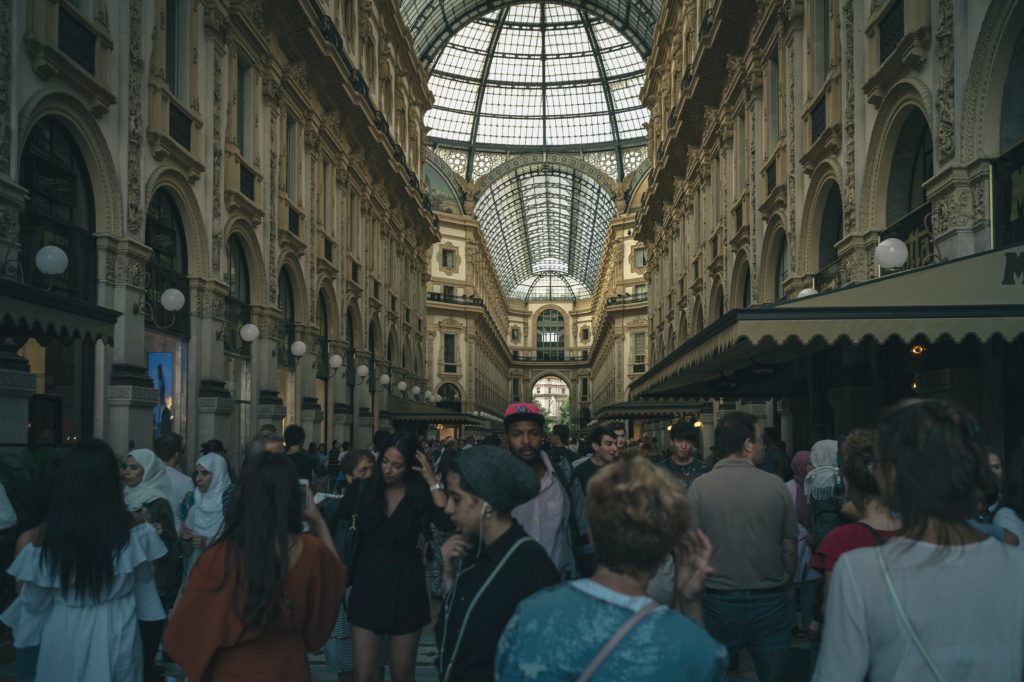
Published October 13, 2022
I met with Henri de Lubac twice during the 1980s. He was already very old. He lived alone in Paris at the time, except for the young priest his Jesuit brothers had assigned to assist him. I remember his threadbare clerical suit. I remember his smile and his white hair. We talked about his memories of religious life and the then-current state of the Catholic Church. Yet I remember very little of what he said. My inner fanboy kept intruding; kept reminding me that I was sitting with one of the truly great Christian minds of the 20th century, a man of unparalleled intellect and equal humility — a fact duly noted by George Weigel in his superb new book, To Sanctify the World. But more on that in a moment.
Effectively blacklisted by Rome in the 1950s for perceived errors of doctrine, Lubac bore his intellectual exile with fidelity and goodwill. Rehabilitated by Pope John XXIII, he went on to play a vital role, as a peritus, or theological expert, at the Second Vatican Council (1962–65), a global gathering in Rome of some 2,500 bishops. Lubac died in 1991, leaving behind a body of work now regarded as a treasure of the church.
In the ferment after the council, Lubac fell out of favor with some of his former colleagues for being too faithful, too “conservative.” When Pope John Paul II, who from his own time as a delegate at Vatican II admired Lubac, made him a cardinal in 1983, Lubac’s Jesuit community refused to purchase his red cassock, saying the money would be better spent on the poor. Lay friends stepped in with the needed resources, but Lubac spent his last years in a kind of second exile, neglected by his own Jesuit brothers for being insufficiently “progressive.”
In effect, within his own religious family, Lubac was a casualty of the Catholic civil war that began even before Vatican II ended. Civil wars are especially nasty. The Catholic version created turmoil and fragmentation throughout the late 1960s and the ’70s. It went largely underground during the John Paul II and Benedict XVI years, but it’s back now in quarters of the current pontificate, like a stubborn case of herpes simplex.
By Catholic count, the church has seen 21 ecumenical councils over two millennia. All have involved some measure of conflict. Since the church is populated and run by humans, some of the conflicts have been conducted with fists, bricks, and bats. It’s regrettable but really shouldn’t surprise. Details of Christian doctrine matter. Unlike the Jewish people, the Christian community is defined by and bound together primarily by shared belief. Dissent on essentials is destructive. This is the reason for constitutive statements such as the Nicene Creed, John Calvin’s Institutes of the Christian Religion, or Paul VI’s Credo of the People of God. Ecumenical councils can release centrifugal energy. That energy can trigger unpredictable results. It can take decades for the meaning of a council to settle in and restore stability not just to the internal community life of Catholics but also to the way they engage the world.
We’re still in the very long wake of Vatican II. That’s why an accurate understanding of the council has value to persons well beyond the borders of the church. And that’s why To Sanctify the World is so important.
Readers with an interest in culture, and in the role of religion in shaping it, will likely know the Weigel name. George Weigel is a 40-year chronicler of religious affairs, the author of numerous books and too many articles and lectures to count. He’s also a clear and rigorous thinker at a time when the delights of “walking together” as Catholics seem to obscure some obvious questions, such as where we might actually be heading. Some of his books, such as The Cube and the Cathedral, have been small items of outsized worth and cultural insight. Others, like Letters to a Young Catholic, have been exercises in mentoring. Evangelical Catholicism is a robust call to recover Christian missionary zeal and the mandate of Matthew 28:19.
But the author is best known for his two-volume biography of John Paul II, Witness to Hope and The End and the Beginning. John Paul — then Cardinal Karol Wojtyła — had an active hand in Vatican II. Weigel’s friendship with the late pope gave him unique access to background on the council’s major players and issues, and its sometimes fractious dynamics. That special relationship and the knowledge gleaned from it undergird To Sanctify the World.
As Weigel notes, Vatican II was a response to circumstances never before encountered by the church. Previous councils had typically dealt with heresies, doctrinal disputes, or clarifications of belief. But they had operated in a world saturated by religion, even when the religion was pagan or alien to Christianity. The Second Vatican Council was called to deal with a world increasingly irreligious; a self-confident, materialist world of science and technology — and in the developed nations, material abundance — that saw no need for a God. The reforming task of the council thus had two themes: aggiornamento, updating the message and spirit of the church wherever possible, the better to engage modern man; and ressourcement, recovering the zeal of the early church by a return to her ancient sources. The goal of the church, however, remained the same: to sanctify, or “make holy,” the human experience in a fractured world.
Weigel breaks To Sanctify the World into three simple divisions: why the council was necessary; what it actually taught; and the interpretative keys needed to unlock its real meaning. He takes care to explain not just the context but also the content and importance of the council’s central documents. His research is exhaustive. He thus builds his case elegantly and persuasively for the Karol Wojtyła–Joseph Ratzinger understanding of Vatican II. No period in the life of the church is without its failures, but these two men, in their pontificates, simultaneously fulfilled John XXIII’s original intent for the council and served as countervailing centripetal forces against post-conciliar unraveling. The result was 30-plus years of both pastoral renewal and intellectual excellence, married to a confident evangelical spirit — qualities now sorely missed. In contrast, the sheer shabbiness of the intellectual enterprise now dominant in Rome is embarrassing. This need not be an indictment of Pope Francis. But it’s very much an indictment of some who claim to serve his ministry.
We’ve arrived at one of the periodic inflection points in Catholic life. On the one hand, we have those — including some of our leaders — eager to sign a peace treaty with the sexual revolution and other ambiguous traits of the modern world, and on the other hand, those who see our times as a graced moment for evangelical courage and zeal. Remembering and explaining the past is sacred work because it grounds our identity. It also recalls our purpose. What Weigel achieves in To Sanctify the World is an American version, applied to Vatican II, of Hubert Jedin’s brilliant multivolume study of the Council of Trent, its prelude, content, aftermath, and meaning. And as with Jedin’s work, Weigel’s book will be a standard of conciliar scholarship for many years to come.
Having begun with Henri de Lubac, I’ll end with the same.
Lubac once wrote: “There is nothing more demanding than the taste for mediocrity. Beneath its ever-moderate appearance, there is nothing more intemperate. . . . It suffers no greatness; shows beauty no mercy.” He added: “When the ecclesiastical world is worldly, it is only a caricature of the world. It is the world, not only in greater mediocrity, but even in greater ugliness.”
We live in a time of celebrated worldliness and belligerent mediocrity, both in our public square and in our religious leadership. But there are islands of light — testimonies that remind us of who we really are.
To Sanctify the World is one of them.
Francis X. Maier is a senior fellow in the Catholic Studies Program at the Ethics and Public Policy Center. Mr. Maier’s work focuses on the intersection of Christian faith, culture, and public life, with special attention to lay formation and action.
Photo by Egor Myznik on Unsplash
Francis X. Maier is a Senior Fellow in the Catholic Studies Program at the Ethics and Public Policy Center. Mr. Maier’s work focuses on the intersection of Christian faith, culture, and public life, with special attention to lay formation and action.











